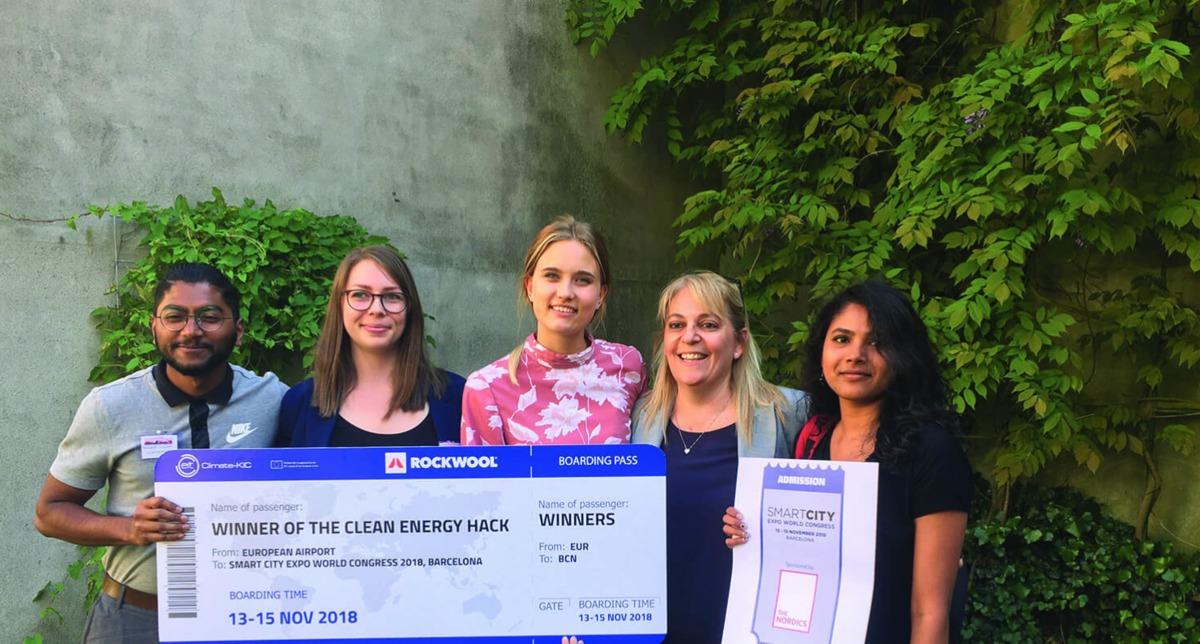Clean energy, urban farming and sustainable housing hacked at urban solutions conference

Clean energy, urban farming and sustainable housing were the hot topics being tackled at this year’s Copenhagen’s Clean Energy Hack. The event, part of the Nordic Clean Energy Week 2018, brought together 50 students to work on climate challenges put forward by the cities of Singapore, Hamilton, Stavanger and Umea.
From 11 groups, four teams were selected by a Rockwool and EIT Climate-KIC panel to pitch their ideas to city representatives and participate in workshops at the Sustainable Urban Solutions Conference, part of Nordic Clean Energy Week.
One of the four cities, Singapore, faces challenges in meeting its increasing population with clean energy, and better food security, as it is almost completely reliant on imports of both. The city is interested in increasing uptake of renewable energy and urban farming in public housing, using rooftops as energy collectors and community spaces and potentially doing both solar harvesting which also provide shading for crops.
Team Urban Blocks, made up of Charlotte Frejlev, Line Lauritzen, Pradeep Kadam and Pransi Verma came up with the solution of micro-grids of multiple east-west oriented solar panel systems on rooftops with a blockchain based system for energy trading. The rooftops of buildings could be leased out to agribusinesses for controlled urban farming.
Osmoforest, made up of Marco, Mitra and Steen suggested the idea of urban rooftop farming, based on osmosis technology in which traditional pipes from the ventilation system is covered in an H2O charged sponge and another sponge charged with electrolytes and other nutrients. The two sponge layers are covered by protective case resembling a natural shell or bark with CO2 capturing properties.
The city of Hamilton is looking into deep retrofitting of social housing and needed innovative tools to help identify where it is most needed, initial planning, stakeholder engagement, procurement, execution, and post-retrofit management.
The Fantastic Four, Tommasi Miori, Simon Tradler, Deepasundar Ponnusamy and Heidy Froelich, came up with a digital platform providing transparent and reliable data about the social and environmental impact of buildings to housing providers. By contributing to a more holistic view of risk, the transparency should increase the attractiveness of social housing projects to investors as well as insurance companies.
Another team, Captain Hamilton, proposed behaviour change, obtained through an indexed rental system based on monthly water and energy consumption. The rent would be divided into two parts, of which one is fixed and the other one can be discounted based on consumption. Beyond the monetary incentive, the municipality would also offer workshops and training to tenants in how they can further lower their utility bills.
————–
Having taken part, all four teams are now planning workshops with Clean Energy Hack’s main sponsor, Rockwool. OsmoForest has joined the Danish Climate Launchpad competition.
The winning team, Urban Blocks will go on to pitch their solution at the Nordic Pavilion at the Smart City World Expo in Barcelona in November.
The post Clean energy, urban farming and sustainable housing hacked at urban solutions conference appeared first on Climate-KIC.
News published on Climate KIC
Consult the source



